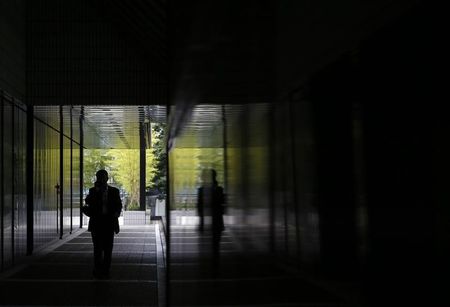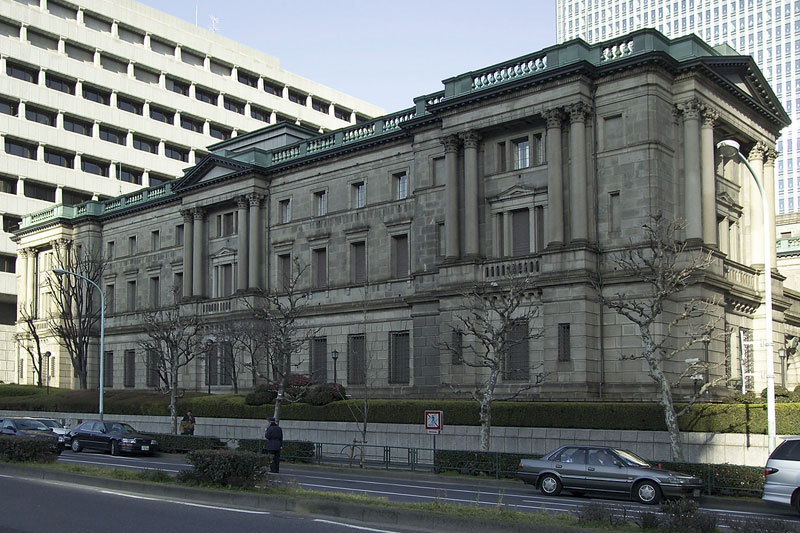By Leika Kihara
TOKYO (Reuters) - The Bank of Japan is set to maintain its massive asset purchases and its optimistic view on the economic outlook this week, unfazed by a slew of weak data that has heightened expectations of a deeper-than-expected contraction in the second quarter.
Some BOJ policymakers may propose offering a bleaker view on exports and output than last month, given the recent gloomy data that cast doubt on its projection that the economy will fairly quickly ride out the pain from a sales tax hike in April.
But Governor Haruhiko Kuroda's resolutely upbeat forecasts are expected to prevail, and changes in the BOJ's language, if any, will be minor and unlikely to signal the chance of further monetary loosening in the near-term.
Many on the policy board still cling to hope that a rebound in U.S. and Chinese demand will gradually start to lift exports, sources familiar with the central bank's thinking said.
Some analysts, however, warn that the BOJ risks being seen as out of touch with reality if it were to maintain its optimistic view that export growth remains "flat" and output "continues to rise moderately as a trend."
"The export and output figures must have been pretty disappointing for the BOJ, so I would expect it to revise down its assessment for these components," said Yasuo Yamamoto, senior economist at Mizuho Research Institute.
"The BOJ won't ease any time soon. But if the economy and prices undershoot its projections, the central bank may come under government pressure for further stimulus around the time it issues new long-term projections in October," he said.
At its two-day rate review that ends on Friday, the BOJ is not expected to change its policy framework, under which it has pledged to increase base money by 60-70 trillion yen (347-405 billion pounds) per year through aggressive asset purchases, largely of Japanese government bonds, in a bid to reflate the long-moribund economy.
The BOJ is also likely to stick to its view the world's third-largest economy will continue to recover moderately as the effect of the sales tax hike starts to recede.
BOARD DIVIDED ON EXPORT VIEW
Exports unexpectedly fell in June for a second straight month, disappointing BOJ officials who had projected a rebound in the second quarter that would help cushion the economy from the sales tax hike.
In a further blow to the BOJ's rosy estimates, industrial output fell in June at the fastest pace since the March 2011 earthquake and inventories surged, suggesting both external and domestic demand had been weaker than many companies expected.
Pessimists within the BOJ acknowledge that a build-up of inventory in June may weigh on output, and the overall economy, in the third quarter if demand does not rebound strongly enough.
Kuroda remained optimistic even after the latest data, saying last week that while export growth remains flat, it will recover as global growth picks up.
But several BOJ board members, including Koji Ishida, warned last week that structural issues may further delay an export rebound, underscoring a growing concern among central bankers over the fragile state of Japan's economic recovery.
The board is likely to engage in heated debate on whether to focus on the underlying weakness in exports and output, or on prospects of a recovery as global growth picks up.
The delay in an export pick-up has puzzled many policymakers, who had expected overseas shipments would get a boost from a weak yen that gives Japanese goods a competitive advantage overseas.
The resilience in domestic demand has allowed the BOJ to shrug off the export weakness for now, but some analysts warn that domestic sales of big-ticket items such as automobiles are taking longer to recover from the tax hike pain.
While the BOJ already expects Japan's economy to shrink in the second quarter due to the effect of the tax hike, the contraction may prove to be bigger - and the rebound more modest - than initially projected, some analysts say.
A Reuters poll showed analysts expect gross domestic product data, due to be released on Aug. 13, to show the economy shrank at an annualised 7.1 percent in the second quarter.

Some private-sector analysts say such a big contraction in the second-quarter may mean economic growth in the current business year will far undershoot the BOJ's current projection of an 1.0 percent increase.
It could also heighten private economists' scepticism that the BOJ will be able to meet its target of pushing inflation to 2 percent sometime next year without further stimulus.
(Editing by Kim Coghill)
